Input interpretation

antimony trioxide
Chemical names and formulas
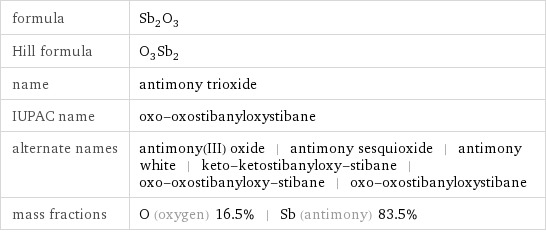
formula | Sb_2O_3 Hill formula | O_3Sb_2 name | antimony trioxide IUPAC name | oxo-oxostibanyloxystibane alternate names | antimony(III) oxide | antimony sesquioxide | antimony white | keto-ketostibanyloxy-stibane | oxo-oxostibanyloxy-stibane | oxo-oxostibanyloxystibane mass fractions | O (oxygen) 16.5% | Sb (antimony) 83.5%
Lewis structure
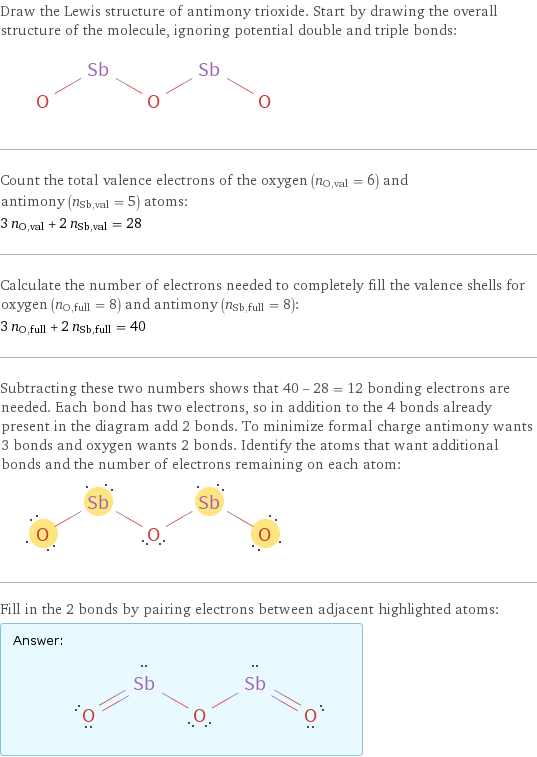
Draw the Lewis structure of antimony trioxide. Start by drawing the overall structure of the molecule, ignoring potential double and triple bonds: Count the total valence electrons of the oxygen (n_O, val = 6) and antimony (n_Sb, val = 5) atoms: 3 n_O, val + 2 n_Sb, val = 28 Calculate the number of electrons needed to completely fill the valence shells for oxygen (n_O, full = 8) and antimony (n_Sb, full = 8): 3 n_O, full + 2 n_Sb, full = 40 Subtracting these two numbers shows that 40 - 28 = 12 bonding electrons are needed. Each bond has two electrons, so in addition to the 4 bonds already present in the diagram add 2 bonds. To minimize formal charge antimony wants 3 bonds and oxygen wants 2 bonds. Identify the atoms that want additional bonds and the number of electrons remaining on each atom: Fill in the 2 bonds by pairing electrons between adjacent highlighted atoms: Answer: | |
Basic properties
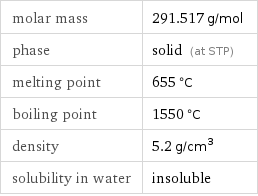
molar mass | 291.517 g/mol phase | solid (at STP) melting point | 655 °C boiling point | 1550 °C density | 5.2 g/cm^3 solubility in water | insoluble
Units

Solid properties (at STP)
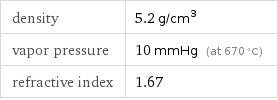
density | 5.2 g/cm^3 vapor pressure | 10 mmHg (at 670 °C) refractive index | 1.67
Units

Thermodynamic properties
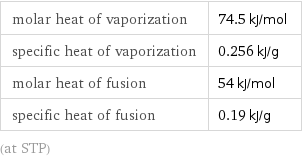
molar heat of vaporization | 74.5 kJ/mol specific heat of vaporization | 0.256 kJ/g molar heat of fusion | 54 kJ/mol specific heat of fusion | 0.19 kJ/g (at STP)
Chemical identifiers
![CAS number | 1309-64-4 PubChem CID number | 27652 PubChem SID number | 24852108 SMILES identifier | O=[Sb]O[Sb]=O InChI identifier | InChI=1/3O.2Sb/rO3Sb2/c1-4-3-5-2 RTECS number | CC5650000 MDL number | MFCD00011214](../image_source/d74dcbeaee99395cf156a6d7836f8377.png)
CAS number | 1309-64-4 PubChem CID number | 27652 PubChem SID number | 24852108 SMILES identifier | O=[Sb]O[Sb]=O InChI identifier | InChI=1/3O.2Sb/rO3Sb2/c1-4-3-5-2 RTECS number | CC5650000 MDL number | MFCD00011214
NFPA label

NFPA label
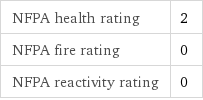
NFPA health rating | 2 NFPA fire rating | 0 NFPA reactivity rating | 0